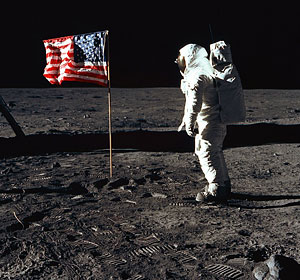Today marks the 40th anniversary of the launch of Apollo 11, the first manned spacecraft to land on the moon.

Astronaut Edwin "Buzz" Aldrin poses for a photo beside the U.S. flag during the first manned lunar landing in 1969. Pope Paul VI told astronaut Neil Armstrong that he was right on the mark in describing the Apollo 11 mission as "one giant leap for mankind." (NASA)
Besides that whole “historic space exploration achievement” thing, the Apollo 11 mission was a monumental event for media — the live video feed from the moon walk was seen by an estimated 500 million people worldwide, the largest television audience at the time. (Although the possible destruction of those original recordings from the lunar cameras probably isn’t going to help change the minds of anyone who believes in the “moon landing hoax.”)
Thankfully, no one accidentally erased the 1969 archives of Catholic News Service. In articles carried by CNS — then called National Catholic News Service — that summer, Catholics’ excitement for the space mission was well-documented. The yellowing, brittle copies of stories we found in our library filled two manila folders labeled “Space Exploration.” They have headlines like “Monks sing ‘space hymn'” (July 19, 1969) and “Pope hails astronauts as ‘conquerors of the moon'” (July 21, 1969).
In the United States, Catholics gave the momentous occasion special attention at Mass. Parishes in Newark, N.J., included a special invocation for a successful mission in their prayer of the faithful, and Cardinal Richard Cushing of Boston published a “Lunar Prayer.” Catholic church leaders celebrated a Mass at the Patrick Air Force Base after touring the Kennedy Space Center in the days before the launch.
Pope Paul VI was particularly excited about the moon landing, if his numerous glowing messages, audiences, and addresses are any indication. The Vatican even gave the space program a papal flag to leave on the surface of the moon, along with a message from Pope Paul VI.
“For the glory of the name of God, who gives men such power, we pray and wish well for this wondrous endeavor,” he hand-wrote alongside the text of Psalm 8.
In the following months, however, CNS reported that church leaders across the globe wondered whether the advances might repeat the problems of the last great technology boom, the Industrial Revolution, which some bishops believed created prosperity for certain groups and nations while exploiting or ignoring the rest of society.
“Scientific and technological progress is not always followed by comparable progress in the fields of morality, law and international cooperation,” said New Zealand Cardinal Peter McKeefry in August 1969.
Theologians and church leaders had been questioning the enormous cost of the programs since the start of the “space race.” Four years before the moon walk, CNS reported that German theologian and Jesuit Father Karl Rahner expressed his concern in a June 1965 interview with America magazine.
“I am always surprised to see how little the official church and other Christians have considered the moral implications of space travel,” he said.
“But we must still ask ourselves whether it is not moral vulgarity of a low order to pour out so many billions to send people to the moon, while at the same time we are faced with worldwide hunger.”
Nevertheless, the Rome bureau of CNS reported in October 1969 that Synod of Bishops awarded the three astronauts with a gold medal from the Pontifical Academy of Sciences, and the pope praised the moon landing in a private audience with the astronauts.
“The standard of collaboration and cooperation, and the perfection which was reached … pay tribute to the capacity of modern man to reach beyond himself, to reach beyond human nature, to attain the perfection of achievement made possible by his God-given intelligence,” he said.

This is a super cool post.